Masagaway Town | |
|---|---|
| Country | |
| Region | Galguduud |
| Time zone | UTC+3 (EAT) |
Masagaway or Masagawayn Town is a small town in the central Galgaduud region of Somalia. It is 250 kilometers away from the Somali capital, Mogadishu.
Masagaway Town | |
|---|---|
| Country | |
| Region | Galguduud |
| Time zone | UTC+3 (EAT) |
Masagaway or Masagawayn Town is a small town in the central Galgaduud region of Somalia. It is 250 kilometers away from the Somali capital, Mogadishu.

Somalia, officially the Federal Republic of Somalia, is the easternmost country in continental Africa. The country is on the Horn of Africa and is bordered by Ethiopia to the west, Djibouti to the northwest, the Gulf of Aden to the north, the Indian Ocean to the east, and Kenya to the southwest. Somalia has the longest coastline on Africa's mainland. Somalia has an estimated population of around 17.1 million, of which over 2 million live in the capital and largest city Mogadishu. Around 85% of its residents are ethnic Somalis. The official languages of Somalia are Somali and Arabic, though the former is the primary language. The people of Somalia are Muslims, the majority of them Sunni.
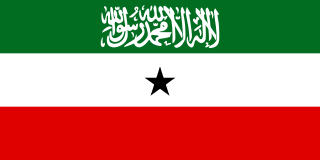
Somaliland, officially the Republic of Somaliland, is an unrecognised country in the Horn of Africa, recognised internationally as de jure part of Somalia. It is located in the southern coast of the Gulf of Aden and bordered by Djibouti to the northwest, Ethiopia to the south and west, and Somalia to the east. Its claimed territory has an area of 176,120 square kilometres (68,000 sq mi), with approximately 6.2 million residents as of 2024. The capital and largest city is Hargeisa. The Government of Somaliland regards itself as the successor state to British Somaliland, which, as the briefly independent State of Somaliland, united from 1960 to 1991 with the Trust Territory of Somaliland to form the Somali Republic.
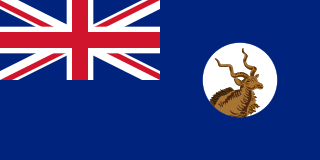
British Somaliland, officially the Somaliland Protectorate, was a protectorate of the United Kingdom in modern Somaliland. During its existence, the territory was bordered by Italian Somalia, French Somali Coast and Abyssinia. From 1940 to 1941, it was occupied by the Italians and was part of Italian East Africa.
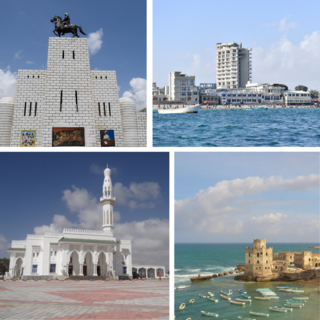
Mogadishu, locally known as Xamar or Hamar, is the capital and most populous city of Somalia. The city has served as an important port connecting traders across the Indian Ocean for millennia and has an estimated urban population of 2,610,483.
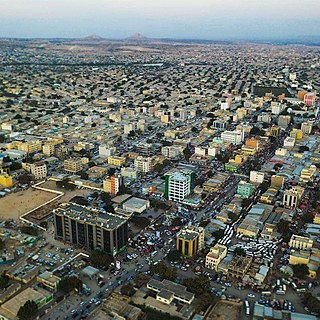
Hargeisa is the capital and largest city of the Republic of Somaliland, a de facto sovereign state in the Horn of Africa, still considered internationally to be part of Somalia. It is also the regional capital of the Maroodi Jeex region of Somaliland.

The Somali people are a Cushitic ethnic group native to the Horn of Africa who share a common ancestry, culture and history. The East Cushitic Somali language is the shared mother tongue of ethnic Somalis, which is part of the Cushitic branch of the Afroasiatic language family, and they are predominantly Sunni Muslim. Forming one of the largest ethnic groups on the continent, they cover one of the most expansive landmasses by a single ethnic group in Africa.
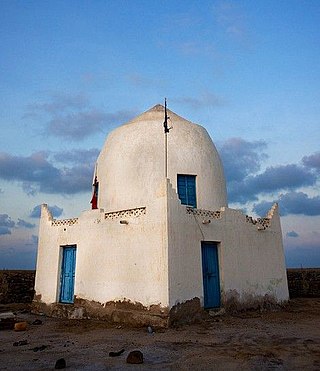
Zeila, also known as Zaila or Zayla, is a historical port town in the western Awdal region of Somaliland.

The Somali Civil War is an ongoing civil war that is taking place in Somalia. It grew out of resistance to the military junta which was led by Siad Barre during the 1980s. From 1988 to 1990, the Somali Armed Forces began engaging in combat against various armed rebel groups, including the Somali Salvation Democratic Front in the northeast, the Somali National Movement in the northwest, and the United Somali Congress in the south. The clan-based armed opposition groups overthrew the Barre government in 1991.

The Islamic Courts Union was a legal and political organization founded by Mogadishu-based Sharia courts during the early 2000s to combat the lawlessness stemming from the Somali Civil War. By mid-to-late 2006, the Islamic Courts had expanded their influence to become the de facto government of most of southern Somalia.

The Ethiopian occupation of Somalia, also called the Ethiopian invasion of Somalia or the Ethiopian intervention in the Somali Civil War, was an armed conflict that lasted from late 2006 to early 2009. It began when military forces from Ethiopia, supported by the United States, invaded Somalia to depose the Islamic Courts Union (ICU) and install the Transitional Federal Government (TFG). The conflict continued after the invasion when an anti-Ethiopian insurgency emerged and rapidly escalated. During 2007 and 2008, the insurgency recaptured the majority of territory lost by the ICU.

The African Union Mission in Somalia (AMISOM) was a regional peacekeeping mission operated by the African Union with the approval of the United Nations Security Council. It was mandated to support transitional governmental structures, implement a national security plan, train the Somali security forces, and to assist in creating a secure environment for the delivery of humanitarian aid. As part of its duties, AMISOM supported the Federal Government of Somalia's forces in their battle against Al-Shabaab militants.

The Ajuran Sultanate, natively referred to as Ajuuraan, and often simply Ajuran, was a medieval Muslim Empire in the Horn of Africa. Founded by Somali Sultans it ruled over large parts of the Horn of Africa during the Middle Ages. It rose to power in the 13th century and would dominate the Indian Ocean trade for centuries to come. Through a strong centralised administration and an aggressive military stance towards invaders, the Ajuran Empire successfully resisted Oromo invasions from the west and fought against Portuguese incursions from the east.

The 2006 Islamic Courts Union offensive is the period in the Somali Civil War that began in May 2006 with the Islamic Courts Union's (ICU) conquest of Mogadishu from the Alliance for the Restoration of Peace and Counter-Terrorism (ARPCT) and continued with further ICU expansion in the country. Following the outbreak of the war on December 21, 2006; by December 24, direct Ethiopian intervention in the conflict in support of the Transitional Federal Government (TFG) was no longer denied by the Ethiopian government. The Eritrean government denied any involvement despite Ethiopian claims to the contrary.

The Ethiopian–Somali conflict is a territorial and political dispute between Ethiopia, Somalia, and insurgents in the area, Originating in the 1300s, the conflict's most recent iteration began in the late 1940s when the Somali-inhabited Ogaden region was handed back to Ethiopia by the British. In the years following, tensions culminated in numerous insurgencies and several wars. However, because of the Somali Civil War and the lack of a functioning central government since the collapse of the Democratic Republic of Somalia in 1991, Ethiopia has the upper hand militarily and economically.
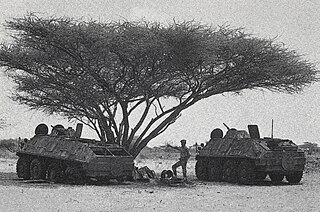
The 1982 Ethiopian–Somali Border War occurred between June and August 1982 when Ethiopia, sending a 10,000 man invasion force backed by warplanes and armored units, supported by thousands of Somali Salvation Democratic Front (SSDF) rebels invaded central Somalia.

The Somali civil war (2009–present) is the ongoing phase of the Somali civil war which is concentrated in southern and central Somalia. It began in late January 2009 with the present conflict mainly between the forces of the Federal Government of Somalia assisted by African Union peacekeeping troops and al-Shabaab militants who pledged alliegence to al-Qaeda during 2012.

Somali mythology covers the beliefs, myths, legends and folk tales circulating in Somali society that were passed down to new generations in a timeline spanning several millennia in Somalia and Djibouti dating back 6000 years ago. Many of the things that constitute monotheistic Somali mythology today are traditions whose accuracy have faded away with time or have been gentrified considerably with the coming of Islam to the Horn of Africa.

Somali architecture is the engineering and designing of multiple different construction types such as stone cities, castles, citadels, fortresses, mosques, temples, aqueducts, lighthouses, towers and tombs during the ancient, medieval and early modern periods in Somalia and other regions inhabited by Somalis, as well as the fusion of Somalo-Islamic architecture with Western designs in contemporary times.

Ahlu Sunna Waljama'a (ASWJ) is a Somalia-based paramilitary group consisting of moderate Sufis opposed to radical Salafism. The group opposes hardline capital punishment, stonings, and limb amputations advocated by extremist interpretations of Islam, as well as laws banning music and khat. The group seeks to protect religious shrines from demolition.

Operation Linda Nchi had the Kenya Defence Forces enter southern Somalia beginning in 2011. The Kenyan government declared the operation completed in March 2012, but its forces then joined AMISOM in Somalia.